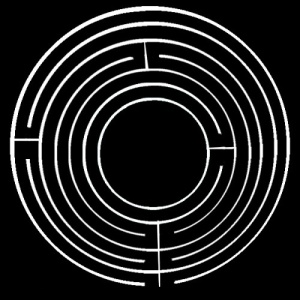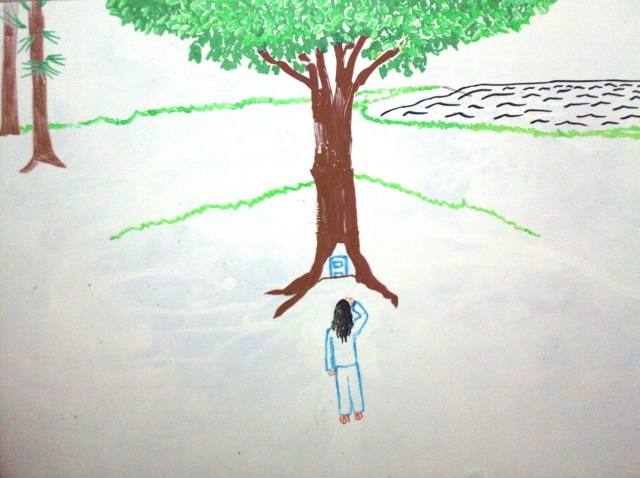The following entry may contain triggering material.
My corporeal roommate Cecil recently asked me how I’d planned to kill myself. I’d made numerous attempts, all emotionally serious of course, in the unutterably bleakest mindset—but, not serious in the sense that I’m alive today because I’d been transported unconscious to some hospital; that hadn’t happened. So, from the outside, I was just making up exaggerated stories so that my whinging would get more serious attention, and my melancholy laziness excused (though my birth family would have held that same attitude otherwise, I’m certain.) From the inside, I had tidied away every trace of my history, spent the wee hours of each morning in the bathtub with a kitchen knife to my neck and failing to lean into it enough to break skin; considered bleach, oven gas, what to overdose on, starvation; on the morning of my 18th birthday I’d tried to jump off the balcony of the 22nd floor—planned for it, left everything that had been mine in the stairwell garbage, so there was nothing for me to go back to—and was most abjectly terrified that I couldn’t follow through with it, though every fibre of my being remained in far too much pain, (intractable pain, every waking moment, seemingly only from living,) to endure any alternative.
Because of that, I can’t help but suspect that most apparent suicides are secretly accidents in at least the final conscious half-second.
I’ve finished reading Marie-Louise von Franz’s Shadow and Evil in Fairy Tales, and it is dated. Jungians remain stodgy about gender binary, of course, but common terms in this text include “primitive”, “crippled”…and Franz openly admits to a childhood imaginary monster being human. Because Franz grew up in a neighborhood that very much lacked racial diversity, it seems.
Many other ideas contained in this text, I considered very intriguing and helpful. One of these being how the dead become evil.
…there is a certain amount of life energy in them which has not been exhausted but has been unnaturally blocked before the proper time. The clock’s spring has broken instead of running down, and that unexhausted life energy turns hostile (…) Therefore even people who during their lifetime were really good people and not possessed by evil, can, out of resentment at having been robbed of life, turn into such a thing if they are killed before their time.
That is why late antique invocations of [curse] magic always begin: “Oh, you gods of the Netherworld, Hades, Proserpina, and you the nameless enormous army of those who killed themselves, or who were murdered, or died before their time.” That is a classical late Greek invocation to be found in most of the magical papyri of antiquity.
I’d also told Cecil of my attempt to hang myself from the closet and a twisted-up bedsheet. There’d been a mirror on the inside of the door, and a wide enough gap around the door that the blue evening light could seep in, and I could watch me hang myself.
To Cecil, I’d joked that maybe a mirror does catch at some shade or fade of people, and maybe a future tenant would wake up in the wee hours of the morning, and move to the closet to get a cookie they’d left in the pocket of their trousers that they’d thrown in there, and when they’d open the door, I’d still be hanging there in the mirror, and they would see me hanging there…and reaching out and screaming, in uncanny harmonics, “My cookie!”
…Cecil didn’t think it was funny, either.
It wasn’t true, anyway; I hadn’t really wondered, until now, what sort of ghost I would have been.
To parse this phenomenon on a level of personality and egoism, the evil dead are jealous. To understand it on a level of egoless power dynamic, the evil dead are embodiments of an unlived life, the subtle psychic energy from that which was meant to be lived out and was not. They embody consequence, without interiority.
Almost a decade after the attempt in the closet, I feel fine. I feel happy! No invisible vice tightening around my skull. My ribs don’t feel like a knife rack. I’m not even wracked with anxieties as I was when I was a very small child up to my mid to late teens.
I did get around to proper Mirror Work, recently: looked into a compact that the Dierne Pallis held out to me and I found, at last—palpable venom and poisonous fumes, a ceaseless scream of raw pain in what sounded like my voice (but from the outside, so…not my voice like I know it), and an undertow of sorrow so forceful as to be inescapable.
To which I said, well, yes, obviously, I hope obviously—that’s me in that mirror, for sure. But there’s a bit more to me now.
I’ve lived out all that—or, a comparative lot of that…unlived (oppressed), unspoken (silenced) life.
No more hallucinated planets made of vacuum, or smoke serpents, or insect clockwork dragon…Okay, there’s a flint arrowhead welded to my fetch’s left hand that’s awfully opinionated for an imaginary inanimate object—but that’s just life.
My ghost would have had all the fury of all this unresolved.
I’m in love. This love is requited. I almost wasn’t alive for this. (She almost wasn’t, either, but declined to develop a concept of an afterlife as a consequence, so I wouldn’t presume to speak over that. She’s reading this right now. I love you, Bartie!) In Franz’s interpretation, my ghost would have carried this corrupted potential too: fears never soothed into strength and courage, a world of insecurities never steadied, joys never lived, discoveries never shared.
But when I used to hear such things from recoverees, about how great they’d noticed life could be with an attitude adjusted to “happier than suicidal” I could only take it as condescending glibness. The only response I could muster would be, “oh how nice for you.” Automated, not even lively enough to have a sarcastic grudge behind it.
So…maybe I can’t claim that we need ghost lore and fairytales about the dead, to express something much bigger than a mind can carry—let alone generate.
At this point I’d shoehorn other tidbits about ghosts that I’d picked up before reading Shadow and Evil in Fairytales. The Tiv people don’t appear to have ghost lore, as Laura Bohannan discovered in the attempt to retell Hamlet to her host family in “Shakespeare in the Bush”. Stephen Greenblatt’s “A Touch of the Real” was more about the culture, and especially the literature (nonfiction and fiction), surrounding ghost encounters in medieval Europe. That’s where I read it outright stated that ghost lore and Christian lore fuses divisively (against all my own intuitions of conceptual geometry): Catholic dogma allowed for the belief that spirits of the deceased wandered the earth and interacted with the living; Protestant dogma held that such apparitions could only be evil spirits in the guise of deceased loved ones. As tensions rose between Catholicism and Protestantism, someone could fall under the suspicion of being Catholic just by making a casual mention about ghosts as though they weren’t evil spirits, and that accusation would also come with not a small amount of political baggage.
…It used to be good enough for me that my family calculated every moment of my life as monetary debt—can’t kill yourself yet because you haven’t turned your education into a career, can’t cut your losses because therapy and psychiatry is expensive and we’re coughing up more than you deserve already okay?!
It was a revelation when I entered a discussion about negative reactions to suicide, and I voiced the standpoint I’d come to in the paragraph immediately above. A respondent turned it around with this idea: If I killed myself, even the threat of it in a mention of planning to suicide…it would cause the people with that attitude to question whether the calculated value of their own lives truly held a meaningful measure. To remove compassion from the approach to suicide (or confuse compassion with condescension) was a way to resist bearing witness to their own weakness. (Protective projection, maybe, on the part of us discussing this. I still doubt that threat of existential angst would endanger anyone who wasn’t, say, predisposed genetically to depression. Projection it may be, but it still saved me from internalizing an idea that wouldn’t ultimately have been helpful. I had made a foothold of it because it was unfeeling, at a time that my feelings threatened to fatally overwhelm me.)
Ghost lore could still factor as a thrill. Some Jungians I’d eavesdropped on lately mentioned an adolescent tendency towards fun fictional violence—as adolescence is a frequent breaking point of societal accommodations, leading to Shadow-possessed rebellion, or a fascination with unsavory ideas that an adolescent had not been allowed to explore—death, for one example, externalized as a ghost in a fictional way that could be mastered.
More mature attraction to ghost lore might have more to do with a grieving process. This isn’t to say the “adolescent” (not necessarily the category, but I haven’t figured out yet what would be) use of ghost lore is the wrong way to hold it, only that the same cultural phenomenon can have different significance depending on the developmental phase in an individual person’s life…or, indeed, depending on the culture.
With Franz’s interpretation…It’s weighing on me, the way it hadn’t before, the cosmically colossal loss that a suicide—even of a nobody like me, then and now, no cyclopes-badgering in between—truly is…when the (Jungian) Soul has an instinct for so much more to be lived out or lived down than the ego can own, especially in a mind of such singularity as a suicidal person’s. Stories provide—or, maybe at least to narrative psychologists, stories have provided—an intermediary for this sobering revelation (in my opinion, anyway—immensely sobering.)
For that, I can almost forgive the negligence of Franz’s Shadow & Evil in withholding judgment on this circumstance described: that it’s traditionally (not only commonly, but ingrained in lore as a trope) oppressed and abused people who suicide, having a communal Shadow laid on them in life, having to go through more of the same after death.
(…) there are many types of ghosts, but the worst are those of people who hang themselves. Generally these are the ghosts of women of poor peasant families who, if ill-treated by their mothers-in-law, or if hungry, or over-worked, get discontented. If they quarrel with their sisters-in-law, or are scolded by their husbands, if they don’t see any way out of their trouble, often in despair they will put an end to their lives. They take poison, or jump into a well, but most hang themselves, and such people make those awful ghosts. Our grandfathers say that the ghost of a woman who has committed suicide always tries to seduce other women, for only thus can it go to the Beyond and be reborn (…) and return to life. Until they have found a substitute they have to wander
This post from last year on Gods & Radicals, “Thinking About the Dead” has a more advanced commentary on this, that I like.





